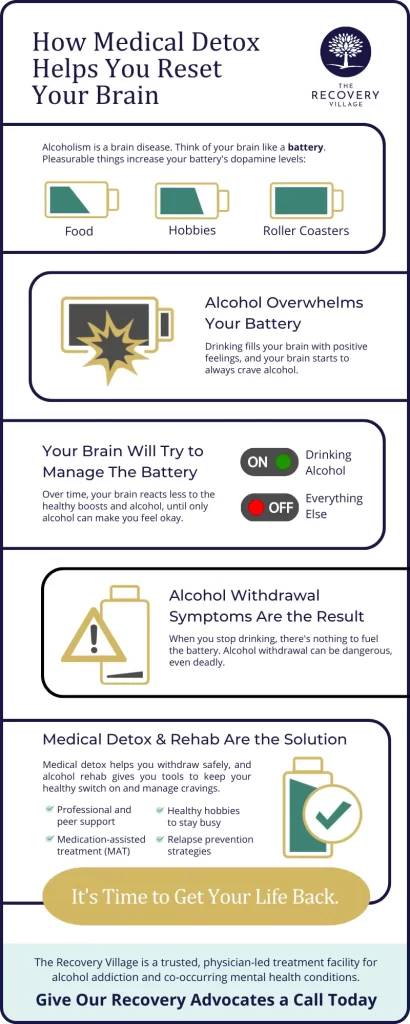Alcohol Detox Programs in South Jersey

By The Recovery Village
Medical Reviewer Michelle Giordano | Editor Theresa Valenzky
Last Updated: April 10, 2023
Editorial Policy | Research Policy
Alcohol detox can help minimize unpleasant and dangerous side effects when a person with an alcohol use disorder stops drinking.
As of 20191, approximately 15 million Americans ages 12 and older suffer from alcohol use disorder (AUD), and only about 7% of those individuals receive treatment. That leaves many of the population at risk for uncomfortable, serious and potentially fatal withdrawal symptoms.
Detoxification (detox) is the first step in a recovery journey that addresses chronic alcohol use. A person with alcohol use disorder is more likely to resume drinking to avoid unpleasant or painful withdrawal effects. Inpatient medical detox provides a safe environment to minimize or prevent these withdrawal symptoms.
What Is Inpatient Alcohol Detox?
Inpatient medical alcohol detox is the gradual removal of alcohol from the body at a licensed facility. This process2 involves managing withdrawal symptoms in a safe and comfortable setting under the supervision of medical professionals. Treatment may include3:
- Administration of medication to ease withdrawal symptoms, prevent seizures and provide sedation
- Monitoring of vital signs, such as blood pressure, heart rate and body temperature
- Hydration and nutritional support that replenishes any deficiencies in vitamins and minerals, including folic acid4 and thiamine4 (vitamin B1)
The treatment received during medical detox will depend on the amount of alcohol an individual drinks, the length of time that person has been misusing alcohol, co-occurring medical conditions and if they have been mixing alcohol with other drugs.
A Safe Space To Detox
24/7 monitoring | Medical care | Symptom management

Alcohol Withdrawal Symptoms and Timeline
Stopping or reducing alcohol abruptly can lead to unpleasant and dangerous withdrawal effects. In general, different symptoms5 will arise after a certain time from a chronic user’s last drink.
Minor withdrawal symptoms can occur approximately 6–12 hours after the last drink, including:
- Insomnia
- Anxiety
- Tremors
- Sweating
- Heart palpitations
- Nausea and vomiting
Alcoholic hallucinosis can occur approximately 12–24 hours after the last drink, and can include:
- Visual hallucinations or seeing things that aren’t there
- Auditory hallucinations or hearing things that aren’t there
- Tactile hallucinations or feeling things that aren’t there, like pins and needles
Withdrawal seizures can occur approximately 24–48 hours after the last drink.
Delirium tremens can occur approximately 48–72 hours after the last drink, and can include:
- Hallucinations (mostly visual)
- Disorientation
- Rapid rise in heart rate
- High blood pressure
- Fever
- Excessive sweating
- Agitation
Delirium tremens6 is an extremely serious effect that can develop from alcohol withdrawal. There is a 5–15% chance6 of fatality from delirium tremens, resulting from complications including slowed breathing, seizures, abnormal heart rhythm and lung injury from aspiration.
Benefits of Medical Detox for Alcohol Withdrawal
It is important that any individual struggling with alcohol use disorder seek help. Because of the potential risks involved with stopping alcohol use, the appropriate medical professionals can assess and address any complications that may arise during the withdrawal process. In certain instances, medications are necessary to improve medical detox outcomes, and in some cases, medically detoxing at a licensed facility can save a person’s life.
Also, this environment is more conducive to preventing relapse than trying to detox at home. When an individual is in a controlled medical setting, healthcare professionals can help manage alcohol cravings. In an inpatient rehabilitation facility, the individual is not exposed to many triggers from their everyday lives. This allows them to focus on getting well and staying healthy.

Drugs Used in Alcohol Detox
Alcohol is a central nervous system depressant that affects several neurotransmitters in the brain, including GABA4 and glutamate. When an individual stops using alcohol or reduces their alcohol intake, central nervous system excitation occurs, leading to withdrawal effects. Different medications may be utilized to help manage alcohol withdrawal, including4:
- Benzodiazepines: These medications help prevent or minimize withdrawal symptoms, including seizures. Generally, long-acting medicines, like Diazepam (Valium), are preferred. However, intermediate-acting benzodiazepines, like lorazepam (Ativan), are better options for those with reduced liver function.
- Anticonvulsants: Some studies show that medicines, such as carbamazepine and divalproex, may help to reduce alcohol cravings; however, more clinical data is needed.
- Beta Blockers: These drugs may be used to help with tremors and lower blood pressure and heart rate.
- Nutritional therapy: Due to dehydration and altered electrolyte levels, IV fluids may be administered, along with certain vitamins and minerals, such as thiamine (Vitamin B1), magnesium and/or multivitamins.
What Happens After Detox?
Medical detox is the first step in a lifelong process to maintain a healthy, substance-free life. After medical detox, an individual, in consultation with a medical professional, will decide if an inpatient rehab, partial hospitalization or outpatient program is appropriate. Whichever an individual is a candidate for, close monitoring is essential for optimal outcomes.
During this time, the patient will receive psychological and behavioral therapies to equip them with the skills needed to stay on the path to recovery. Education will be provided to teach an individual how to avoid triggers or cope with them if they are encountered.
About Our Alcohol Detox Program
The Recovery Village Cherry Hill at Cooper offers an evidence-based medical detox program comprised of highly-trained and empathetic healthcare professionals. At our facility, clients are provided with round-the-clock care and have access to addiction specialists who can address patient concerns at any time.
We believe in a holistic approach to recovery, and our medical detox program is often only the first step. We provide the full spectrum of care, including inpatient rehab, outpatient care and transitioning steps in between.
Break Free From Addiction
If you are struggling with addiction, don’t wait any longer to get help. Reach out to us today to get your life back.

Questions?
Our Recovery Advocates are ready to answer your questions about addiction treatment and help you start your recovery.
Sources
- National Institute on Alcohol Abuse and Alcoholism. “Alcohol Facts and Statistics.” March 2022. Accessed October 7, 2022.
- Kattimani, Shivanand; Bharadwaj, Balaji. “Clinical Management of Alcohol Withdrawa[…]ematic Review.” Industrial Psychiatry Journal, July, 2013. Accessed October 7, 2022.
- U.S. National Library of Medicine. “Alcohol Withdrawal.” MedlinePlus, January 17, 2021. Accessed October 7, 2022.
- DeSimone, Edward; Tilleman, Jennifer; Powell, Trenton. “Treatment of Alcohol Withdrawal Syndrome[…]awal Syndrome.” U.S. Pharmacist, November 17, 2014. Accessed October 7, 2022.
- Bayard, Max; et al. “Alcohol Withdrawal Syndrome.” American Family Physician, March 14, 2004. Accessed October 7, 2022.
- Rahman, Abdul; Paul, Manju. “Delirium Tremens.” StatPearls, August 27, 2021. Accessed October 7, 2022.



